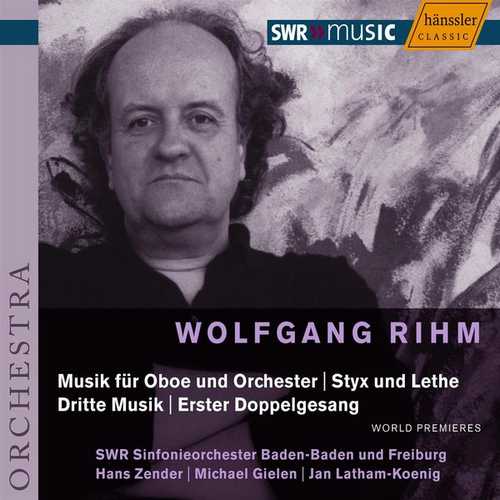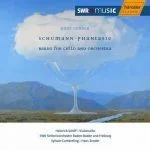
Composer: Wolfgang Rihm
Performer: Alexander Ott, Lucas Fels, Gottfried Schneider, Hirofumi Fukai, Walter Grimmer
Orchestra: SWR Sinfonieorchester des Südwestrundfunks
Conductor: Hans Zender
Format: FLAC (tracks)
Label: Hänssler
Catalogue: HAEN93185
Release: 2007
Size: 313 MB
Recovery: +3%
Scan: cover
01. Music for Oboe and Orchestra
02. Styx and Lethe
03. Dritte Musik für Violine und Orchester
04. Erster Doppelgesang
Wolfgang Rihm says he is one of the most performed, most discussed and most successful living composers. And one of the most productive, as well: word has it that his opus numbers would already be far above four hundred, were he to assign such, while his expositors and commentators have already identified three distinct “creative periods”. Presumably, more will be added, since
Rihm’s oeuvre is growing as continually and fluidly as his five (so far) “Symphonies fleuves”. As his friend, the philosopher Peter Sloterdijk, characterizes him, “Plenitude is his credo, and the stream which arises anew in flowing is his element.” Rihm’s confession, his “Donaueschingen Creed” of 1974, so bold for that time, has since lost none of its authority: “Music must be full of emotion, the emotion full of complexity.”
Wolfgang Rihm (born in 1952) is one of the most important European composers of the late twentieth to early twenty first centuries, but his work is little known in America. He is famous for his productivity; before his 50th birthday, he had written over 400 pieces. The four concertos recorded here are similar in their manic energy, offering few moments of repose. The expressive directions for Music for oboe and orchestra include the instructions “as if overwound,” “wild and funny,” and “frantic,” and those phrases aptly describe the effect of his work. Rihm is an unabashed modernist, and the surface of his music may be too prickly for some listeners, but it’s deeply expressive, and at times very funny, such as at the end of the oboe concerto.
Rihm has written, “Am I a writer when I try to set up characters in music, when I am concerned with drama, lyric rhythm, semantic clarity?” He is an expert dramatist, as his operas Die Eroberung von Mexico and Jacob Lenz demonstrate, and he brings that same instinct for drama to his orchestral music. In his first Doppelgesang, a double concerto for viola and cello, he was specifically thinking about the friendship and conflict between Verlaine and Rimbaud, and Styx und Lethe for cello and orchestra is a sonic depiction of the two rivers that flow through the underworld. An awareness of those associations can help the listener make sense of the colorful but thorny music. A variety of orchestras, conductors, and soloists were gathered for this CD and they perform with high energy and an obvious commitment to the music’s expressive content. For the adventurous listener, Rihm’s music offers much to ponder and appreciate.



